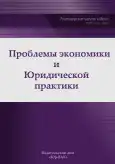Digital development of complementary currency markets: legislative aspects
- Authors: Shiryaeva L.A.1
-
Affiliations:
- Joint Institute for Nuclear Research (JINR)
- Issue: Vol 19, No 5 (2023)
- Pages: 283-291
- Section: Regional and Sectoral Economics
- URL: https://journal-vniispk.ru/2541-8025/article/view/252638
- DOI: https://doi.org/10.33693/2541-8025-2023-19-5-283-291
- EDN: https://elibrary.ru/PMTHMC
- ID: 252638
Cite item
Abstract
The purpose of the research. The legal aspect requires a clear understanding, and can be considered one of the determining factors of the success in realizing complementary currency (CC) projects, because many of them have a lot questions in the legislative framework. In this regard, the author finds it expedient to find out to what extent some countries are more sympathetic to such currency initiatives than others. To this end, the author confines himself to a relatively representative sample of five countries—France, Great Britain, Canada, Italy and Russia—in terms of the degree of liberality to the СС. The main measure for selecting countries were the degree of popularity of the СС-projects in the countries and the availability of the necessary information. In the context of the current paradigm of digitalization of financial markets in each country, the author assessed the achieved level of «digitization» of the projects under study.
Results. As a result of the conducted research, the author comes to the conclusion that there are no separate laws concerning СС projects in the system of legislations of different countries. It is possible to determine the position of a country in this area only by examining the sub-items of currency legislation, securities laws, as well as laws related to banking activities. At the same time, in countries that are liberal to СС projects, there are separate communities that support such initiatives and contribute to their emergence and development, while regulating their appeal.
Full Text
##article.viewOnOriginalSite##About the authors
Lubov A. Shiryaeva
Joint Institute for Nuclear Research (JINR)
Author for correspondence.
Email: shiryaeva@jinr.ru
ORCID iD: 0000-0002-1423-6802
SPIN-code: 6475-2599
graduate student, Senior Accountant
Russian Federation, DubnaReferences
- Kucherov I.I. Legal tender as a category of financial law // Journal of Russian Law, 2014. No. 8, pp. 38–47.
- Sitnik A.A. Regulation of monetary circulation in the UK // Moscow State Law Academy, 2017, № 2 (123).
- Shiryaeva L.A., Valiullin H.H. Markets of alternative currencies and payment systems // Audit and financial analysis, 2019. № 6, pp. 91–97.
- Shiryaeva L.A. Network aspects of the circulation of alternative currencies // Collection of plenary reports of the Joint International Congress SPEC-PNO-2020. Under the general editorship of S.D. Bodrunov. Moscow, 2021. v. 3, pp. 573–583.
- Shiryaeva L.A., Valiullin H.H. On the methodology for analyzing projects of complementary currencies // Russian Economic Journal, 2022. № 4, pp. 114–128.
- Burhouse S., Osaki Y. National Survey of Unbanked and Underbanked Households // Federal Deposit Insurance Corporation, 2021.
- Konieczna P. Local currency systems in german-speaking countries—selected issues // Association of Economists and Managers of the Balkans. Conference Proceedings: 2nd International Scientific Conference ITEMA, 2018.
- Lietaer, B., Stodder J. The Macro-Stability of Swiss WIR-Bank Credits: Balance, Velocity and Leverage// Comparative Economic Systems, 2016.
- Michel A., Hudon M. Community Currencies and Sustainable Development: A Systematic Review // Ecological Economics, 2015. №116. pp. 160–171.
- Seyfang,G., Longhurst, N. Growing green money? Mapping community currencies for sustainable development // Ecological Economics, 2013. №86, pp. 65–77.
- The World Bank. Doing Business 2020. Comparing Business Regulation in 190 Economies // The World Bank, 2020. p. 236.
Supplementary files









